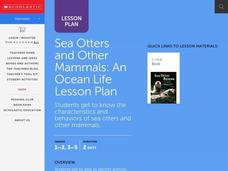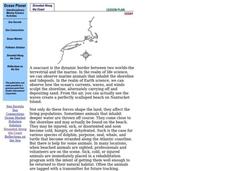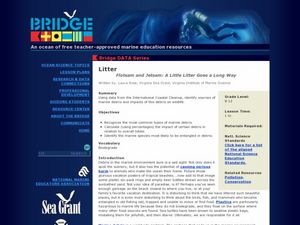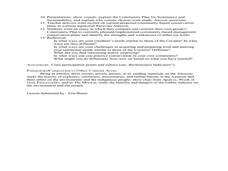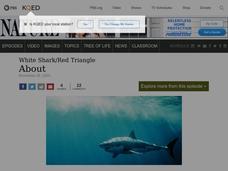American Museum of Natural History
Moving Mammals
How many different ways do mammals move from place to place? An online resource uses animation to show how different mammals move. Learners use a slider to speed up or slow down a variety of mammals. The versatile lesson works as a...
Curated OER
Mammals of the Deep Blue
Third graders study ocean mammals. They explore various websites and databases to answer questions and record answers about whales and dolphins. Finally they use the information obtained to write a report about them.
American Museum of Natural History
What's This? Feeding
Some species have pretty creative methods for catching food. Young scientists learn about some interesting ways organisms get the nutrients they need by navigating an online interactive lesson that would be suitable for a remote learning...
Curated OER
Dolphins
Students investigate dolphins. They complete a Webquest, explore various websites, listen to audio clips of dolphin sounds, play an online puzzle game, answer discussion questions, and read and evaluate newspaper articles about...
Curated OER
The Census of Marine Life
Students explain diversity and abundance in marine life. For this oceanic biology lesson, students collect information for various geographical areas to collect a census of marine life.
Curated OER
Ocean Life
Students identify marine mammals according to specific characteristics. Students read about marine mammals and list their characteristics. Next, students play a Whale and Otter game on the playground to simulate whales swimming across...
Curated OER
Predator/Prey Activity: Fish Feeding, Environments, and General Behavior
Students explore concepts of environment and survival among different marine life, focusing on the ocean environment.
Curated OER
Stranded Along The Coast
Students reflect and investigate how a seacoast is the dynamic border between two worlds-the terrestrial and the marine. In the realm of life science, we can observe marine animals that inhabit the shoreline and tidepools. In the realm...
Curated OER
An Imaginary Creature And Then Using Describing And Action Words for a Creative Writing Exercise
You have to collect lots of materials (boxes, bags, toilet paper rolls, etc.) for this lesson to work successfully. After modeling how to create an imaginary creature out of the collection of recycled materials, let your class search...
Curated OER
SPLASH – Monitoring Humpback Whales
Students view a video about the humpback whale and why it is endangered. In this endangered species lesson, students recognize the importance of observing and following an endangered species in an ecosystem. Students identify the animals...
Curated OER
The Future of Arctic Sea Ice
Students research about the importance of sea ice to world climate and sea organisms. In this earth science lesson, students create a model of present and future Arctic sea ice communities. They discuss how ice melting affects...
Curated OER
Guetemala's Changing Forest
Eighth graders compare their local ecological zone to the tropical rainforest. In this natural ecology lesson, 8th graders complete an activity about the differences in ecological zones. They compare their biome to the Guatemalan...
Curated OER
Small Wonders
Students investigate some of the 'mysteries' of the animal, marine and insect worlds, and create student books explaining their findings to younger students.
Curated OER
LitterFlotsam and Jetsam: A Little Litter Goes a Long Way
Students explore the concept of environmental stewardship. For this science lesson, students investigate data from the International Coastal Cleanup, identify sources of marine debris, and discover the impacts of this debris on wildlife.
Curated OER
Feeding: Fast Food
Students calculate the rates of feeding for the average baleen whale, and compare the energy requirements of whales with humans.
Curated OER
Supermarkets, Sustenance and Sustainability
Students investigate jungles and the people who depend upon them. In this sustainability lesson plan, students research wild life conservation and discover the importance of a jungle to Amazonian people. Students create a group...
Curated OER
Fighting Conservation Crime
Students identify and interpret the evolution and sources of law in Canada. Students compare and contrast the legal rights and responsibilities of individuals, groups, and organizations in Canadian society. Students write a one-page...
Curated OER
Natural Inquirer
Pupils interview wildlife experts to gain information needed to research and write a report about an aquatic plant or animal affected by climate change.
Curated OER
Shark Attack
Students examine the white shark. They think critically about a set of shark facts and predict whether the statements are true or false. Students describe a year in the life of a white shark living in the Red Triangle. They create a...







